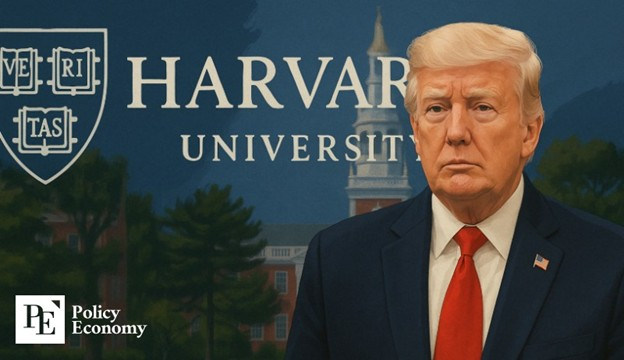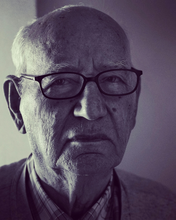Trump Cracks Down on 'Leftist Education,' Even Monitoring International Students' Social Media
Input
Modified
U.S. State Department to Pre-Screen International Students' Social Media Trump Threatens Harvard Financially After University Defies His Orders "Revenge for Youngest Son’s Rejection?" — Mockery and Speculation Spread

In a sweeping escalation of his administration’s ideological war on what he labels “leftist education,” President Donald Trump is rolling out aggressive new measures that directly target both international students and elite academic institutions. The government has suspended student visa interviews across the globe and is preparing to implement stringent social media surveillance for all future applicants. At the same time, a bitter clash is unfolding between Trump and top universities, particularly Harvard, with accusations flying, lawsuits emerging, and speculation growing that the president’s actions may be fueled by personal resentment as much as political doctrine. What began as political rhetoric has turned into official policy, carrying serious implications for academic freedom, immigration, and the international standing of American higher education.
Screening, Suspensions, and Social Media Surveillance
On May 27, the U.S. State Department issued a directive to American embassies worldwide to immediately halt the scheduling of visa interviews for international students and exchange visitors. The order applied to all F, M, and J visas, which are typically granted to students attending academic programs, vocational training, or exchange research. According to the department, this suspension is a preliminary step toward enforcing new procedures that will include the examination of visa applicants’ activity on platforms such as Instagram, X (formerly Twitter), and TikTok. These new guidelines, the department noted, would soon be released to all U.S. embassies.
Although the Trump administration has justified the decision by citing national security and the need to combat terrorism and antisemitism, critics argue that this is part of a broader attempt to purge “leftist ideologies” from academia. NBC News highlighted that President Trump has long accused universities of harboring left-wing bias, and the sudden halt to visa processing appears to be an extension of that ideological crusade.
Despite the administration’s rationale, the scope and implementation of the planned social media monitoring remain unclear. According to reports from Axios, the review will likely include applicants’ posts, likes, shares, and comments. However, there is widespread uncertainty about what type of content might raise red flags. Politico, for example, questioned whether simply posting an image of the Palestinian flag could subject applicants to additional scrutiny. The absence of clear standards has raised concerns even within the State Department, where some officials are reportedly frustrated by the vague nature of the guidelines and worry about the risks of arbitrary enforcement.
Elite Campuses Targeted Amid Rising Tensions
While international students are bracing for intensified surveillance and restricted access, elite U.S. universities are also feeling the weight of the administration’s pressure. The Trump administration has singled out Ivy League schools such as Harvard, Columbia, and Princeton, accusing them of failing to adequately respond to anti-Israel sentiment on campus. Officials have argued that Diversity, Equity, and Inclusion (DEI) programs embedded in these institutions promote ideological agendas and should be dismantled entirely.
Harvard has found itself at the center of the storm. On May 22, the U.S. government notified the university that it intended to revoke its certification under the Student and Exchange Visitor Program (SEVP), a move that would prohibit it from enrolling international students. In response, Harvard filed a motion for a temporary restraining order. The U.S. District Court in Massachusetts granted the request, ruling that immediate enforcement of the policy would inflict irreparable harm on the university. The legal victory was temporary but significant, highlighting the intensifying tug-of-war between academia and federal authority.
In the days that followed, President Trump escalated the conflict. On May 25, he took to Truth Social to demand a list of all international students currently enrolled at Harvard, along with their countries of origin. He claimed that one-third of Harvard’s student body consists of foreigners, including individuals from countries that, in his words, are “not friendly to the United States.” He insisted that the public had a right to know who these students were. The next day, Trump went further, announcing that he was considering redirecting $300 million in federal support originally designated for institutions like Harvard to vocational schools instead. The message was clear: elite universities could either fall in line with federal expectations or face financial consequences.

Barron and the Ivy League: Personal Feud or Policy?
As this high-stakes clash between the Trump administration and elite academia deepens, a new theory has emerged that paints the battle in a more personal light. Rumors have circulated on social media and in news outlets like the New York Post and The Economic Times suggesting that Trump’s aggressive stance toward Ivy League universities may be motivated, at least in part, by the alleged rejection of his youngest son, Barron Trump, from Harvard. Though unconfirmed, the theory has gained traction online and become part of the broader narrative.
One Facebook user noted that all of the schools Trump is now attacking—Harvard, Stanford, Columbia—were rumored to have declined Barron’s application. The post quickly went viral, resonating with those who believe Trump’s education policy is less about ideology and more about personal revenge. On X, another user demanded transparency from Harvard, calling on the school to release Barron Trump’s application and rejection letter to clarify the president’s motivations. Democratic Senator Sheldon Whitehouse added fuel to the speculation in April by posting on X, “I wonder how many Trumps have been rejected by Harvard?”
In response to the growing controversy, First Lady Melania Trump’s spokesperson, Nicholas Clemens, issued a statement to quash the rumors. He clarified that Barron had never applied to Harvard and denied claims that a representative had submitted an application on his behalf. Clemens confirmed that Barron began attending New York University’s Stern School of Business in September of the previous year. President Trump himself had spoken proudly of his son’s achievements, stating in an interview at the time that Barron had been accepted to multiple universities and had chosen NYU’s Stern School because it was “a great school.”
Despite these denials, the perception that Trump’s policies may be fueled by personal grievance continues to cast a long shadow over the administration’s actions. As ideological crackdowns blur with personal conflict, and as universities and courts push back against executive overreach, the battle over “leftist education” in the United States reveals itself to be far more complex than a mere political campaign. It is now a collision of power, ego, and the fundamental question of what role education should play in a democratic society.





















